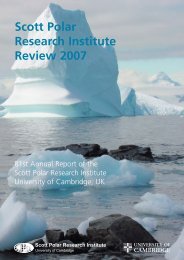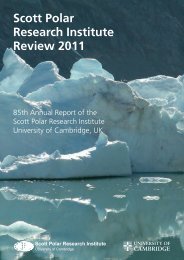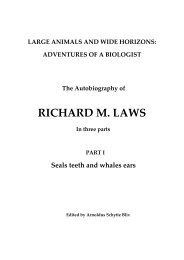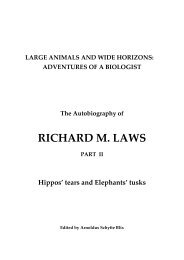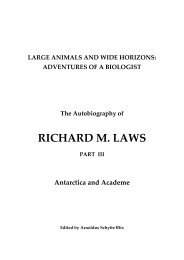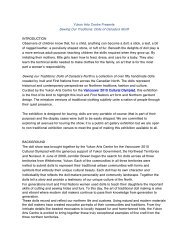Acrobat PDF version of SPRI Review 2004 - Scott Polar Research ...
Acrobat PDF version of SPRI Review 2004 - Scott Polar Research ...
Acrobat PDF version of SPRI Review 2004 - Scott Polar Research ...
Create successful ePaper yourself
Turn your PDF publications into a flip-book with our unique Google optimized e-Paper software.
Reindeer at Hornsund, Spitsbergen<br />
Time and social suffering in indigenous self-government negotiations in Canada<br />
Stephanie Irlbacher Fox analysed attempts in Canada over the<br />
past 30 years to reconcile Aboriginal rights and title with<br />
Canadian sovereignty. Using case studies from her own<br />
experience as a negotiator, she examined relations between<br />
indigenous and federal levels <strong>of</strong> government and the nuances<br />
<strong>of</strong> both structure and process within such negotations.<br />
Canada’s aboriginal policies <strong>of</strong>ten interpret symptoms <strong>of</strong><br />
suffering as signs <strong>of</strong> a “dysfunction” arising internally among<br />
indigenous peoples, rather than as a consequence <strong>of</strong> the<br />
country’s social, political and economic order. Developing<br />
Veena Das’ idea that the state makes and unmakes the<br />
meaning <strong>of</strong> suffering, thereby perpetuating its own<br />
reproduction <strong>of</strong> social inequality, she shows how the diagnosis<br />
<strong>of</strong> dysfunction - the “dysfunction theodicy” - constitutes a<br />
denial <strong>of</strong> history, particularly <strong>of</strong> history as systemic injustice.<br />
She argues that the pathogenic element in this situation lies<br />
not within indigenous society itself, but in the absence <strong>of</strong> any<br />
space for the acknowledgement and expression <strong>of</strong> this<br />
injustice, and thus for a practical attempt at reparation.<br />
Piers Vitebsky<br />
Reindeer migration and nomadic sacred space<br />
The interplay between the repeated annual migration <strong>of</strong><br />
reindeer and the sense <strong>of</strong> space among the herders who<br />
accompany them has been studied in the Russian Far East.<br />
Reindeer movement is tied particularly to the bottlenecks <strong>of</strong><br />
spring calving grounds and winter pastures containing<br />
lichens, but the animals’ instinct towards cyclical repetition<br />
is also tempered by their subtle responses to changes in the<br />
environment such as weather variability, predator<br />
populations and human politics. Among the Eveny <strong>of</strong><br />
northeastern Siberia, studies <strong>of</strong> cases in which animals and<br />
herders are transferred for administrative or personal<br />
reasons between herds and landscapes, show parallel<br />
processes <strong>of</strong> confusion and adaptation among both animals<br />
and humans, as newcomers are socialised into the group<br />
and the opportunities and limitations <strong>of</strong> an unfamiliar<br />
environment are explored. The experiential nature <strong>of</strong> the<br />
herders’ indigenous knowledge is seen to resemble the<br />
behaviour <strong>of</strong> the reindeer themselves, in being characterised<br />
not simply by detailed knowledge <strong>of</strong> a specific terrain, but<br />
also by a flexibility which can be applied to new locations.<br />
This openness is reflected in the nomadic sacralisation <strong>of</strong><br />
space as part <strong>of</strong> the process <strong>of</strong> knowing it. Each place<br />
becomes habitable for a few days through the act <strong>of</strong><br />
pitching a tent, lighting a fire, and making an <strong>of</strong>fering to<br />
the local spirit. In contrast to sedentary societies, which<br />
build permanent temples or cathedrals to draw pilgrims and<br />
worshippers to a central point, reindeer herders progress<br />
around an unending succession <strong>of</strong> places, taking the<br />
potential for knowing places and perceiving sacredness<br />
wherever they go. There is no focal destination and their<br />
intense involvement with each place fades as the pressure<br />
<strong>of</strong> the animals’ onward migration forces them to move on.<br />
Piers Vitebsky<br />
11



